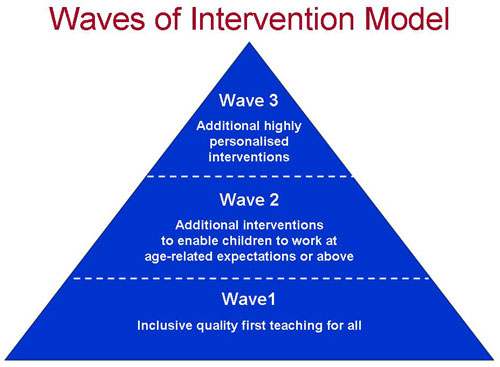Intervention & Support
One system we use to monitor and track our students from Reception to Year 7 is called the waves model where students are organised into three bands based on their current progress and achievement.
• Wave 1 students are travelling as expected and would be achieving an A, B or C grade.
• Wave 2 students are being carefully monitored with accommodations to their learning and supported with research based intervention programs such as Minilit and Macqlit. Students diagnosed with dyslexia fall into this zone. Last year we introduced a highly effective One Page plan for these students which documents needs and specific goals set for them. These are revised at least once a year.
• Wave 3 students are verified students with a disability i.e. language, intellectual or physical. These students have modified learning programs that are developed in consultation with the parent and teachers.
PHONOLOGICAL AWARENESS
When students begin school we conduct an assessment of their Phonological Awareness which includes hearing and creating rhyme (hit, sit, clip), hearing syllables (won / der / ful), blending sounds (c – a – t) to make words and being able to manipulate sounds in words (slip, take away the 'l' you get sip). The Phonological Awareness screen gives us a good indication of those students who are ready to read and write as they have the vital phonological skills to be introduced to written sounds and those who need more practice. Phonological Awareness provides the first building block in Reception classes and is further developed as children move through the year levels. We know that without this ability to work with sounds aurally and orally students will struggle with their literacy learning. We also invest in School Services Officers (SSOs) who provide rigorous small group skill development.
We aim for every child to have good phonological awareness.
Click here for further information
RUNNING RECORDS
We also use running record levels to track that our students are on target to achieve the September standards set by DECD of Reception: level 5 or above, Year 1: level 13 or above Year 2: level 21 or above. Students who are not on track are given further assessments of their progress and may take part in evidence based intervention programs such as Minilit in the early years of school and Macqlit in the primary and middle school.
Running Records are used to monitor student reading accuracy, rate and comprehension. This tells us if books are suitable for a student or not. If a student has between 90 and 100% accuracy and maintains a good rate of reading and comprehends the text then the book is deemed suitable. The book must be an unfamiliar book or text. Less than 90% accuracy or poor comprehension indicates the book is not suitable for the student.
PHONICS
In 2017 we were part of the trial of the UK Phonics assessment which you may have heard about in the media. This assessment has been a really powerful tool for us to determine specific areas of need for our students and to target our teaching of phonics. In 2019 a specialist teacher will be working alongside teachers in R-3 classes to model explicit phonic instruction and provide targeted small group support to students. An enrichment program will also be run for our high fliers.
PROGRESSIVE ACHIEVEMENT TESTS (PAT)
In September of each year students from Year 1-7 sit the PAT in Reading Comprehension and Mathematics. These online tests provide really useful data for us on:
how students are performing compared to other students across Australia,
areas of success, and
areas of focus for individuals and cohorts of students.
Students not achieving the DECD benchmarks are given additional testing to determine if they would qualify for intervention. If warranted, students are involved in Macqlit, also a researched based literacy intervention program. We also provide intervention support for students in Mathematics. Students are assessed and misconceptions identified. Specific areas are targeted to support students to move forward in their understanding in mathematics.
NAPLAN
NAPLAN data is essential for our students in Year 3, 5 and 7 and gives us useful information on the growth of our students. This data also informs our individual priorities for students as well as whole school priorities.
In addition to these tools, classroom teachers use a wide repertoire of assessment tools to determine student achievement, growth and need. We use a range of withdrawal models which gives our students small group support but teachers are well equipped in making accommodations for students to scaffold and support their learning. We have a highly skilled SSO team who implement the intervention and support programs. This team works closely together with leadership facilitation through regular meetings, planning sessions and professional discussions to skill them in providing our students with high quality intervention and support.
The SPELD SA website is a really useful place to access information on learning difficulties such as dyslexia. There is a broad range of information and resources for parents and it is well worth a look http://www.speld-sa.org.au/


